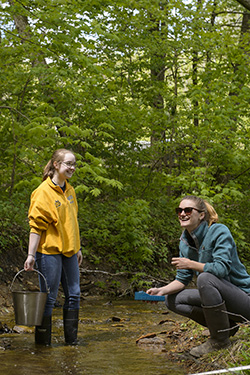On this page:
Why Choose Environmental Sciences?

Do you want interdisciplinary environmental training in biology, chemistry and earth sciences? Consider Wright State’s undergraduate environmental sciences program. Your faculty member will demonstrate a wide range of expertise. They direct active research programs that provide you practical training in current techniques addressing applied environmental problems. Follow in the steps of other program graduates already employed in public health, industrial hygiene/hazardous materials management, water/air quality protection, and other areas.
Become broadly educated for work in public health, industrial hygiene or environmental protection. A field internship program, operated in cooperation with participating environmental science agencies or industries, gives you an opportunity to gain practical work.
Careers
Public Health
The duties of public health officials include community health and epidemiology, restaurant and swimming pool inspections, hazard protection (e.g. asbestos), vector control, proper operation and maintenance of public and private drinking water supplies, and sewage treatment plants. These positions are usually employed by a state, county, or local health department.
Industrial Hygiene
Industrial hygiene scientists help ensure a healthful environment for employees. Specifically, the duties include measuring employee exposure to hazards, evaluating those exposures, and where appropriate, recommending procedures to reduce risks resulting from exposures. Reducing risk may involve communicating information about risks to employees. Employment opportunities may be in the environmental consulting firms, industry, or government.
Environmental Protection
Environmental protection covers those responsibilities of scientists who help ensure a healthful environmental for the general public under the environmental statutes. Duties of environmental protection officials include monitoring air, soil, and water, plants and animals, assessing impacts that chemicals have on individuals, populations, or ecosystems, and investigating the sources of those chemicals. These individuals are employed by consulting firms, large industries, and government.
Real-World Experience
Internship Program Overview
Excellence in the environmental sciences program has been a hallmark of undergraduate education at Wright State for more than three decades. This reputation developed in large part through a group of environmental specialists from a wide range of government agencies and industries working together with Wright State scientists, first to create the program and then to keep it current. The program is more exciting and relevant now than ever before.
The internship is an essential part of the program It provides you with exposure to real world environmental problems and their solutions, and you are the one who decides where you gain this experience.
Goal and Objectives
The goal of the internship program is to provide a practical work experience for students like you who are enrolled in the baccalaureate program. This brief but important exposure to field work will:
- Sharpen your skills by giving you the opportunity to apply already developed knowledge of principles, methods and practices within the environmental sciences
- Prepare you for continuing study by providing a better understanding of the relevance that the course work has to real-world situations
- Afford your sponsoring institution an opportunity to train you and other students, gain use of your skills on a short-term basis, and evaluate your future potential for long-term employment after graduation
- Promote a close working partnership between the university's environmental sciences program and environmental practitioners in business, industry, and government
Types of Intern Programs
The intern experience is relatively flexible. The specifics of your internship will depend on your specific interests, matching those interests with an employer, and satisfying the program criteria. You may spend your entire internship with one institution in a single or multi-faceted approach (e.g., work with issues related to food, water, solid or hazardous materials, environmental toxicology, employee work safety, or public health), or you may work with various institutions in a multi-program approach
Academics and Curriculum
View Bachelor of Science in Earth and Environmental Sciences, Environmental Sciences Concentration program information, degree requirements, and graduation planning strategy in the Academic Catalog. The department offers field courses for practical, hands-on training and experiences in Earth and Environmental Sciences subjects.
Admission
Apply for admission to Wright State University.